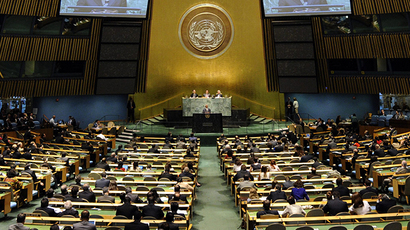'To respect and protect right to privacy': UN votes for end to excessive electronic spying

The UN General Assembly has unanimously called on a curb of supernormal surveillance of communications. The resolution drafted by Brazil and Germany was in response to revelations over the eavesdropping conducted by the US on a global scale.
All 193 UN member states agreed “to respect and protect the right to privacy, including in the context of digital communication.”
The document maintains that internationally recognized human rights should be applied to a person online, specifically singling out the right of privacy.
The resolution suggests making sure national legislation complies with international human rights law to prevent possible breaches.
“While concerns about public security may justify the gathering and protection of certain sensitive information, States must ensure full compliance with their obligations under international human rights law,” the resolution states.
The resolution calls for internationally recognized rights to privacy, extension of internet freedom and urges to put an end to global electronic espionage.
The document stresses that interception of communications and collection of personal data by state surveillance should be more transparent and accountable.
For that reason countries should “review their procedures, practices and legislation regarding the surveillance of communications, their interception and collection of personal data, including mass surveillance, interception and collection, with a view to upholding the right to privacy of all their obligations under international human rights law.”
Unlike resolutions of the 15 member UN Security Council, the UN General Assembly resolution is not legally binding, but it still represents the international opinion on the issue and is important politically.

"With the internet age quickly becoming a golden age for surveillance, this resolution is a critical first step that puts mass surveillance squarely on the international agenda" Cynthia Wong, senior internet researcher at Human Rights Watch, told AP.
"Given the scale of snooping that technology now enables, all states should modernize privacy protection or we risk undermining the internet's potential as a tool for advancing human rights," she said.
Brazil and Germany proposed the resolution after they learnt that the United States was intercepting the communications of both Brazil's President Dilma Rousseff and German Chancellor Angela Merkel.
After the scandal emerged, Chancellor Merkel phoned US President Barack Obama to demand personal apologies and explanations.
President Rousseff in turn not only cancelled her visit to the US, but also prevented an important Brazil-American military contract from being signed.
Brazil rejected a contract for Boeing’s F/A-18 fighter jets in favor of the Swedish Saab’s JAS 39 Gripens. The unexpected rejection of the US bid comes amid the global scandal over the NSA’s involvement in economic espionage activities.
The documents regarding America’s NSA intelligence agency eavesdropping activities leaked by the former National Security Agency contractor Edward Snowden revealed that millions of calls, emails and other communications worldwide were intercepted by the NSA assisted by the ‘Five Eyes’ intelligence-sharing group, consisting of Australia, Canada, New Zealand, UK and the US.
The ‘Five Eyes’ member countries have also supported the UN resolution after successfully diluting the original text, AP reported, downplaying the role of “massive surveillance” in human rights violations. Instead, the resolution mentions “the negative impact" of such surveillance “on the exercise and enjoyment of human rights”.














